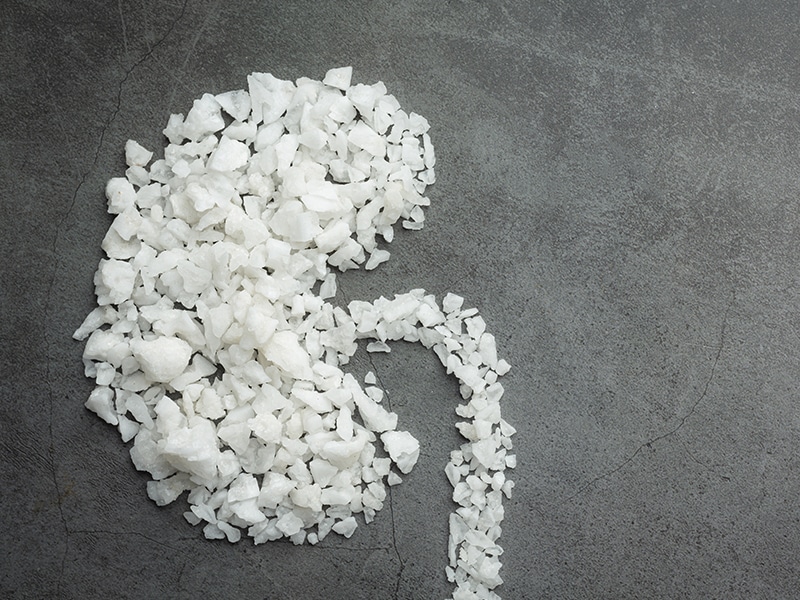Why is good nutrition important for people with kidney disease?
Choosing healthy foods is important for all of us, but it’s even more crucial if you have kidney disease (CKD). Good nutrition can help you:
- Provide energy for your daily tasks
- Prevent infection
- Avoid the loss of muscle mass
- Help maintain a healthy weight
- Slow down the progression of kidney disease
What are the basics of good nutrition?
A balanced diet provides the right amount of protein, calories, vitamins, and minerals every day. Eating a healthy diet, staying physically active, and taking all prescribed medications are all important parts of maintaining your health and feeling well.
Do I need to change my diet if I have kidney disease?
Healthy kidneys help maintain the right balance of nutrients and minerals in your body. However, if you have kidney disease, your kidneys may not perform this function as effectively. You may need to make some changes to your diet.
Ask your doctor about meeting with a specialized dietitian or a nutritionist with training in kidney disease. . A dietitian can guide you in making the best food choices based on your lab results and personal lifestyle. Making dietary changes for better diabetes and blood pressure control can also help prevent kidney disease from worsening. Meeting with a dietitian or kidney nutrition expert is very important.
What kinds of changes do I need to make in my diet?
There’s no one-size-fits-all eating plan for everyone with kidney disease; each plan should be unique and personalized. What you can or cannot eat may change over time, depending on your level of kidney function and other factors. Additionally, if you’re following a special diet for diabetes or heart conditions, you’ll need to adhere to that as well.
People with kidney disease may need to monitor the amount of protein, sodium, potassium, phosphorus, and calcium in their diet. If your kidney disease worsens, you may also need to limit other nutrients. Your dietitian or kidney nutrition expert will instruct you if this is necessary based on blood test results.
Why do I need to control protein, sodium, phosphorus, calcium, or potassium?
Consuming the right amount of protein, sodium, potassium, or phosphorus can help control the accumulation of waste and fluids in your blood. This means your kidneys don’t have to work as hard to remove excess waste and fluid.
Protein:
Your body needs protein to build muscle, repair tissue, and fight infection. If you have kidney disease, you may need to control the amount of protein you consume. Excessive protein intake can lead to waste buildup in the blood. which the kidneys may struggle to eliminate. It’s important to eat the right amount of protein each day. The amount of protein you need depends on your body size, kidney condition, and the amount of protein in your urine. Protein intake should not be too low, as it can cause other problems. Your dietitian or nutrition expert can provide you with the recommended protein intake.
Sodium:
Healthy kidneys regulate the amount of sodium in your body. If your kidneys aren’t functioning well, excess sodium can lead to fluid retention, swelling, high blood pressure, and strain on your heart. Your healthcare provider or dietitian can advise you on the appropriate daily sodium intake.
Potassium:
Potassium works with muscles, including the heart. Too much or too little potassium in the blood can be very dangerous. The amount of potassium you need depends on how well your kidneys are functioning and the medications you’re taking. Your healthcare provider or dietitian can inform you about foods high in potassium and the correct daily intake for you.
Phosphorus:
As kidney function declines, extra phosphorus can begin to build up in the blood. High phosphorus levels can weaken bones. Your healthcare provider or dietitian can determine if you need to limit high-phosphorus foods.
Calcium:
Foods that are good sources of calcium often contain high levels of phosphorus. Your dietitian will let you know if you need to limit calcium. Consult with your doctor before taking any over-the-counter vitamin D or calcium supplements.
Will I have to limit fluids?
Most people in the early stages of kidney disease don’t need to limit their fluid intake. If you’re unsure which stage of kidney disease you’re in, consult your healthcare provider. If your kidney disease worsens, your healthcare provider or dietitian will advise you on whether you need to restrict fluids and how much you should drink each day.
How many calories do I need?
Every person is different. Calories are like fuel. If you don’t consume enough calories, your body will use protein for energy, which comes from your muscles. This can lead to weakness and potential kidney damage. It’s important to ensure you’re getting the right amount of calories. Adequate calorie intake is essential for:
- Maintaining a healthy weight
- Providing energy for your daily tasks
- Helping your body utilize the protein in your food to build muscle and tissues
Too many calories can lead to excess weight gain, which can strain your kidneys. If you’re overweight, some weight loss may be beneficial. If you’re aiming for weight loss or have diabetes, you should meet with a dietitian to create a plan based on your kidney lab results, current food choices, and daily activities.
Should I take any vitamin and mineral supplements?
Most people get enough vitamins and minerals to stay healthy by eating a variety of foods each day. You may need to limit some foods because of your kidney disease, which can lead to vitamin and mineral deficiencies. If so, you may need to take special vitamins or minerals. Only take the vitamins and minerals your healthcare provider or dietitian recommends, as some can be harmful to people with kidney disease.
You should consult with your doctor before taking any over-the-counter medications. Some over-the-counter drugs can be harmful to people with kidney disease.




